If your RV experiences freezing temperatures, you must learn how to winterize your RV. A big part of that process is using RV antifreeze, and there are many questions about what to choose and how to use it correctly.
For starters, let’s give you a brief overview of the RV winterization process:
Now that you’re familiar, here’s everything you need to know about RV antifreeze.
Table of Contents
ToggleWhat is RV Antifreeze?
Some RV owners call it “the pink stuff,” but antifreeze can be many colors. More importantly, it’s a liquid with a much lower freezing point than water. Replacing the water in your plumbing lines with RV antifreeze protects it from freezing, expanding, and potentially bursting.
Most RV antifreeze solutions are either ethanol or propylene glycol-based. Both lower the solution’s freezing point, but propylene glycol also raises the solution’s boiling point. The types of RV antifreeze used at most Camping World Service Centers have a freezing point of -50℉.
Is RV Antifreeze Toxic?
It depends on the antifreeze you’ve chosen. Propylene glycol RV antifreeze is a non-toxic solution safe for RV plumbing systems and holding tanks. That said, care must be taken to completely flush antifreeze and sanitize your RV’s fresh water system when de-winterizing your RV.
Here’s a quick video explaining how to sanitize your RV’s fresh water tank:
You should never dump RV antifreeze on the ground when you flush your system. It should be disposed of properly (more on that below), as it can harm plants and animals if consumed.
Is RV Antifreeze Toxic to Animals?
When using antifreeze or other RV chemicals, your first step should be reading the warning label. While it’s non-toxic for your RV’s pipes, faucets, and fixtures, it can be toxic to humans and animals if consumed.
This is especially true for cats, which can experience adverse effects if exposed to RV antifreeze in small quantities. Dogs are less sensitive but can still suffer negative effects if large quantities are consumed.
Fortunately, you should be using antifreeze when prepping your RV for winter storage and not handling it again until it’s time to de-winterize it. So keep your pets in the house during these processes, and you’ll be fine.
If your animals accidentally consume RV antifreeze, please seek immediate veterinary attention.
How Much RV Antifreeze Do I Need?
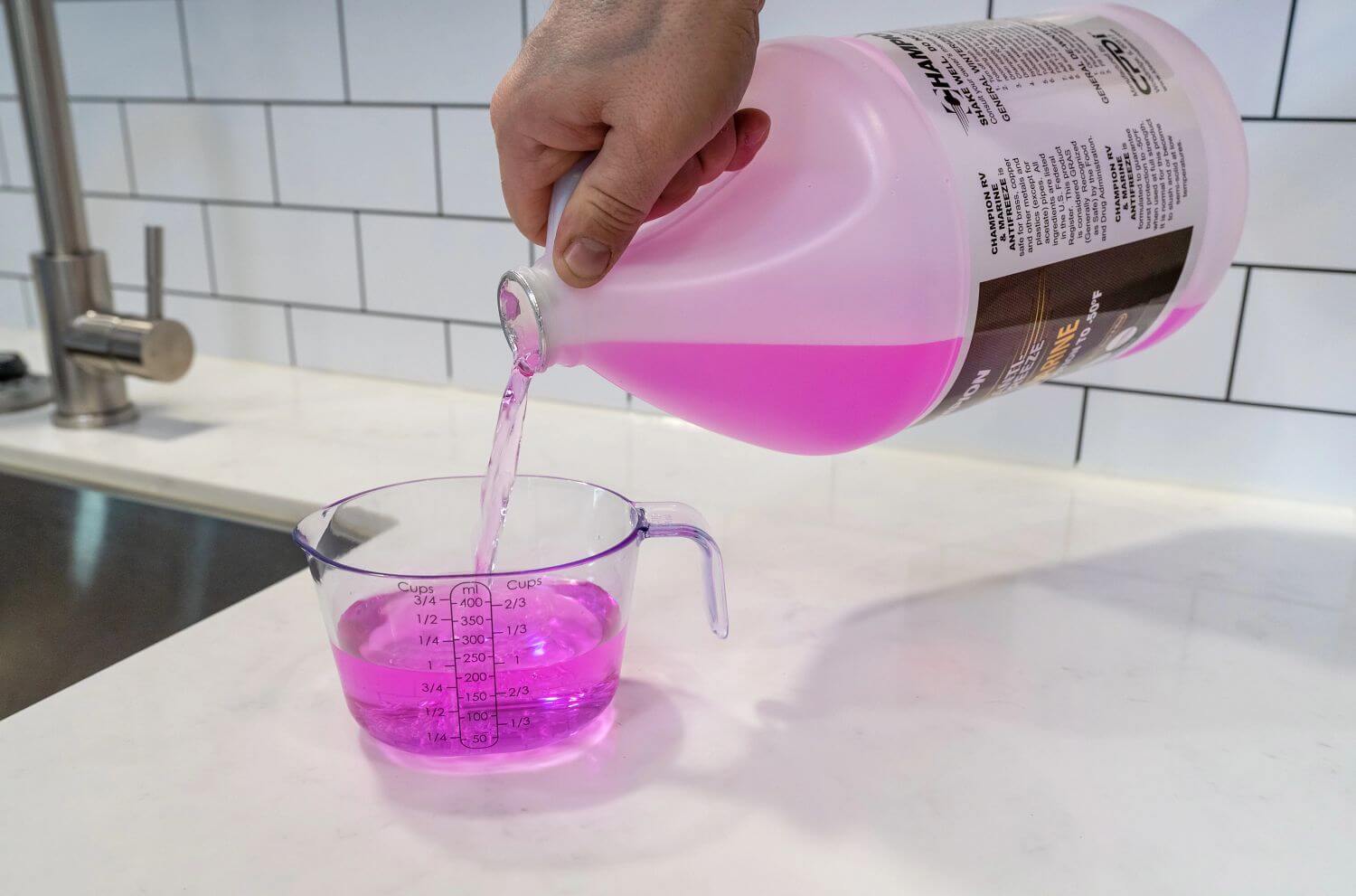
The recommended amount of RV antifreeze for your motorhome or towable depends on the size. You’ll notice in the article and video on RV winterization we recommend bypassing your water heater. This is mainly because you’ll need a lot more antifreeze if you don’t.
Most RVs will use roughly 2-4 gallons of RV antifreeze. This includes what goes down the sinks to ensure any remaining water in the P-traps doesn’t freeze.
Component Definition: P-traps are the U-shaped sections of pipe beneath your sinks that hold water to prevent odors from your gray water holding tank from entering the cabin.
How Much RV Antifreeze to Put in Holding Tanks
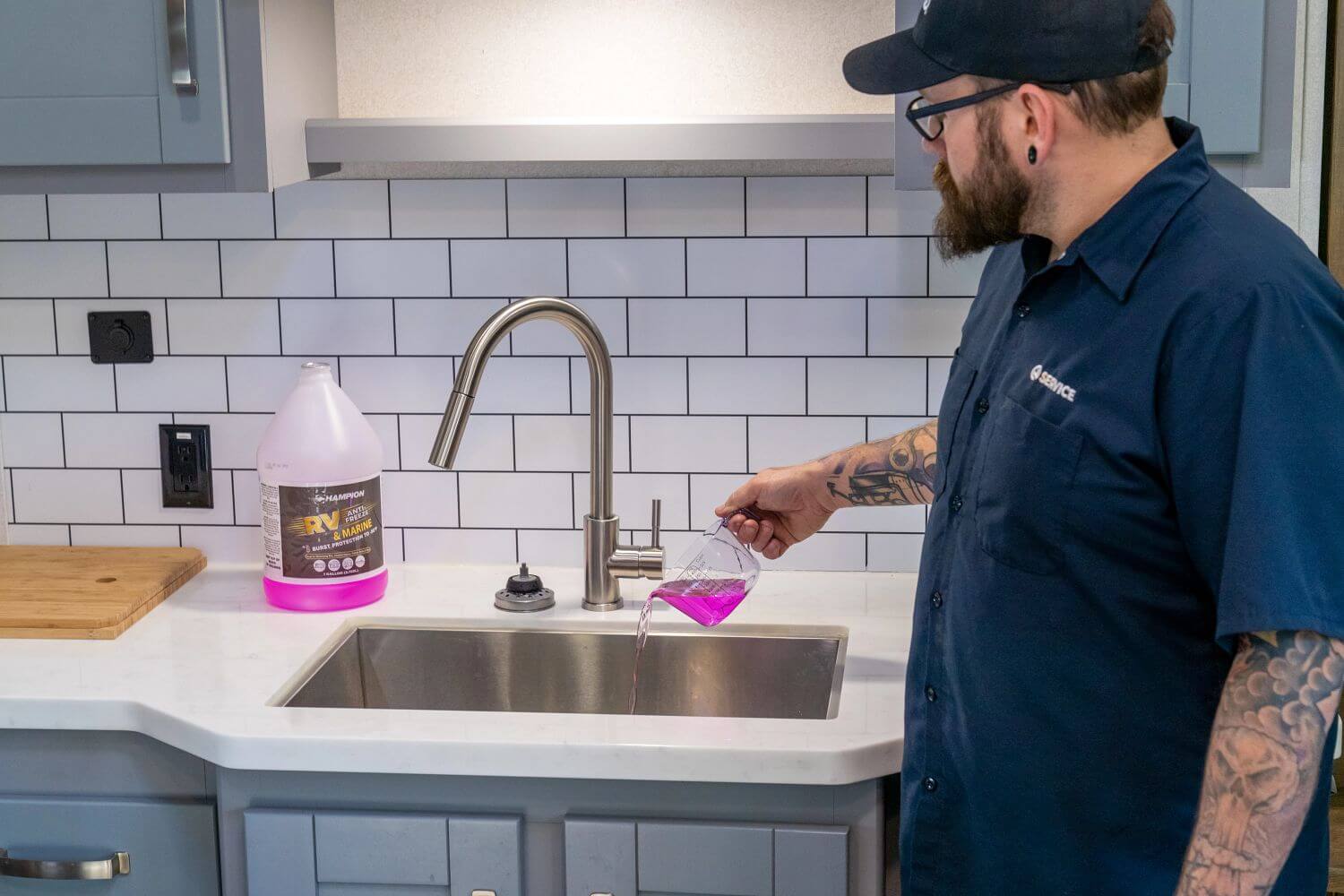
Part of winterizing your RV is pouring antifreeze down the sinks to fill the P-traps. Naturally, this will result in some antifreeze traveling through your plumbing and into the gray water tank.
Pouring 1-2 cups down each sink is recommended. Additionally, you can pour another 2-4 quarts into your RV toilet and then flush the toilet to leave a small amount in your black tank. This can prevent the freezing of residual waste and save you from having to unclog your black tank in the spring.
Adding antifreeze to your black water tank isn’t required, but it can prevent leftover tank waste from freezing and causing tank damage. Even if you frequently use your black tank flush to clean your tank as thoroughly as possible, RV holding tanks almost always hold residual waste.
How to Get Antifreeze Into RV Lines
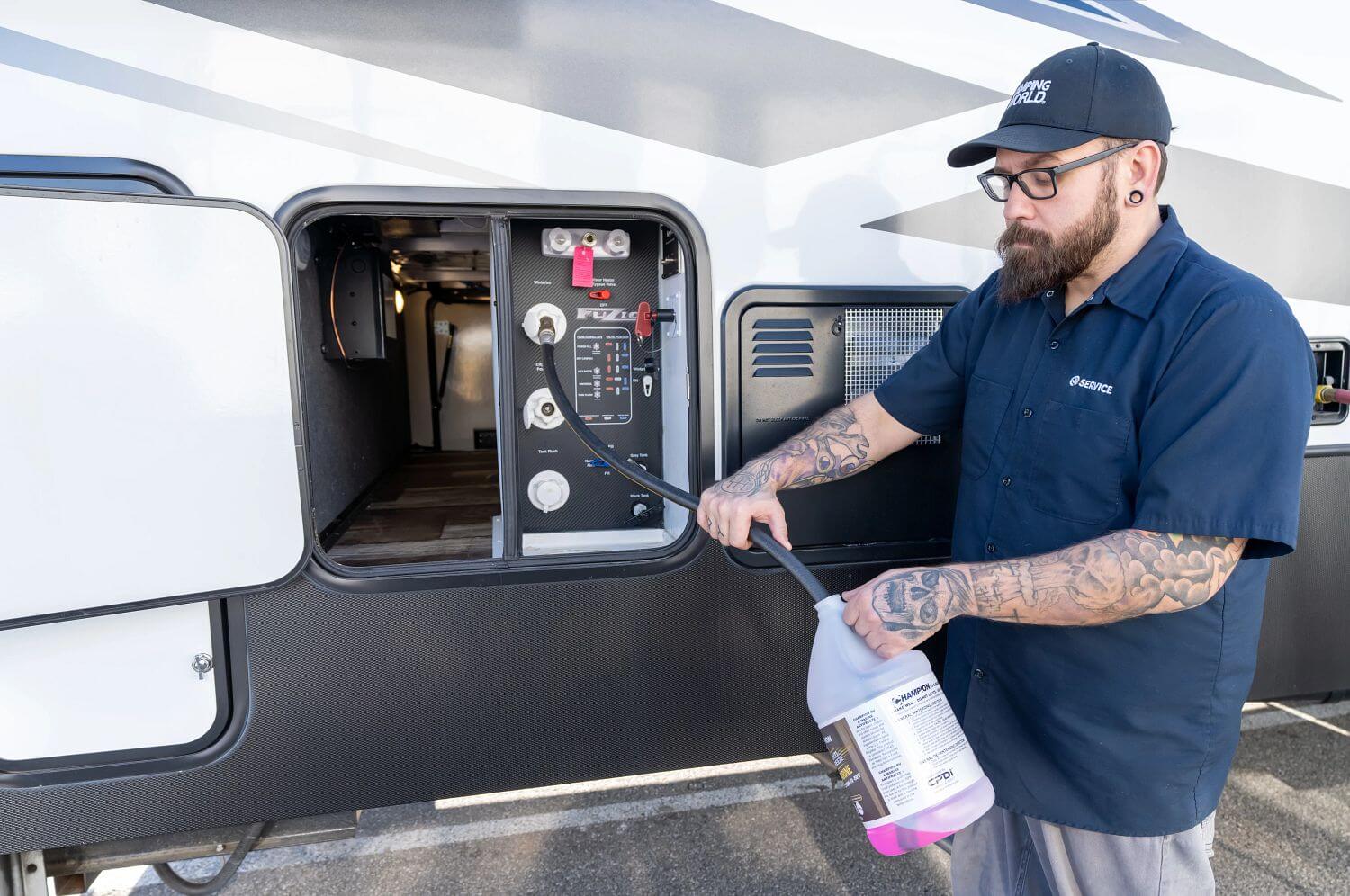
When your RV is winterized at a Camping World Service Center, your trained technician will utilize the T-valve before your water pump and connect a hose to pull antifreeze from the bottle into your RV’s plumbing lines.
You can do this by adding a water pump bypass or disconnecting the line to the pump and connecting a three-foot hose. You’ll need the proper fitting to connect the hose to the pump, and then you can insert the other end of the hose into your bottle of antifreeze to pump it through the system. Before pumping through the system, ensure your water heater is effectively bypassed.
We don’t recommend adding antifreeze to your freshwater tank because it can require up to 10 gallons before the pump can pick it up, especially if your tank has a side pickup. The antifreeze will need to completely cover the pickup opening to keep the pump from sucking air. You’ll also need to spend a lot of time flushing the fresh tank when de-winterizing your RV to get it to stop foaming at the faucets.
How to Flush Antifreeze Out of an RV
Once you’ve winterized your RV, you’ll have antifreeze throughout your plumbing lines, in the P-traps, and a small amount in each of your holding tanks. Before you can safely use your RV’s water system for showering, washing dishes, and drinking, you’ll need to flush all traces of antifreeze.
Here are the quick steps to flushing RV antifreeze:
- Position your RV near a sewer connection and connect your sewer hose.
- Connect a potable water hose to your fresh water inlet and fill your fresh water tank.
- Turn on your water pump to pressurize the system.
- Open all sink and shower fixtures to run water through your system and into the gray water tank. You can also depress the pedal on your RV toilet to run water through your toilet’s plumbing and into the black tank.
- Open all outside showers and low-point drains to let them run until clear water comes out.
- When your gray tank reaches two-thirds capacity, turn off all fixtures and shut down the water pump.
- Go outside and open the tank valves to drain your holding tanks (black, then gray).
- Repeat this process at least 2-3 times until the water coming out of your fixtures is clear and completely free of any colored residue that matches the original color of your antifreeze.
Additionally, go back to the video above to ensure you sanitize your fresh water system thoroughly after flushing the antifreeze.
How to Dispose of RV Antifreeze
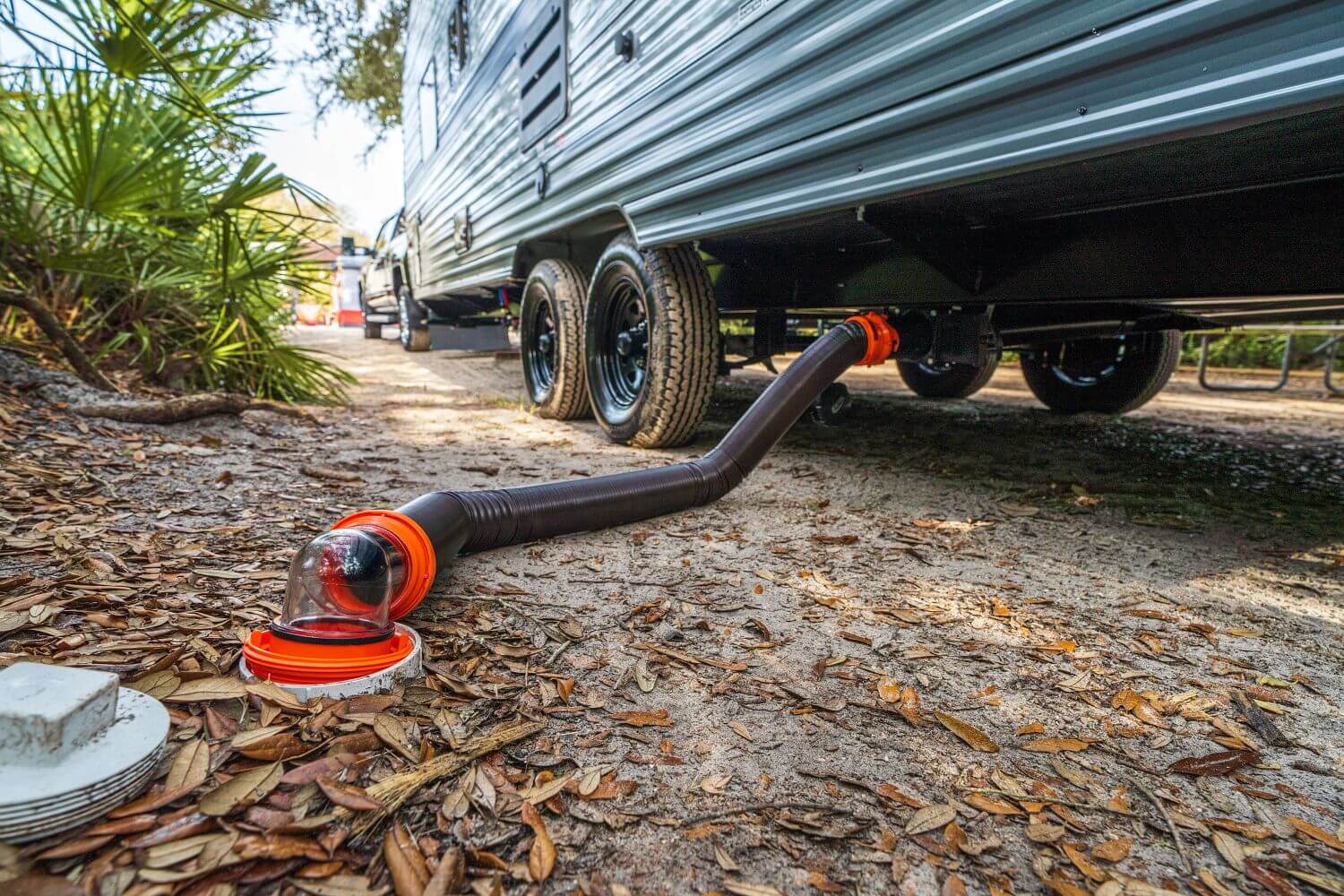
Sure, RV antifreeze isn’t toxic for your RV’s plumbing, but you can’t just dump it on the ground when flushing your system in the spring. Even antifreeze products labeled ‘biodegradable’ should be properly drained into a dump station, septic tank, or residential sewer clean-out.
If you cannot move your RV to dispose of antifreeze in one of these locations, you may also empty it into a portable RV waste tank. You’ll then need to transport that tank to one of the aforementioned locations to dispose of it properly.
Does RV Antifreeze Evaporate?
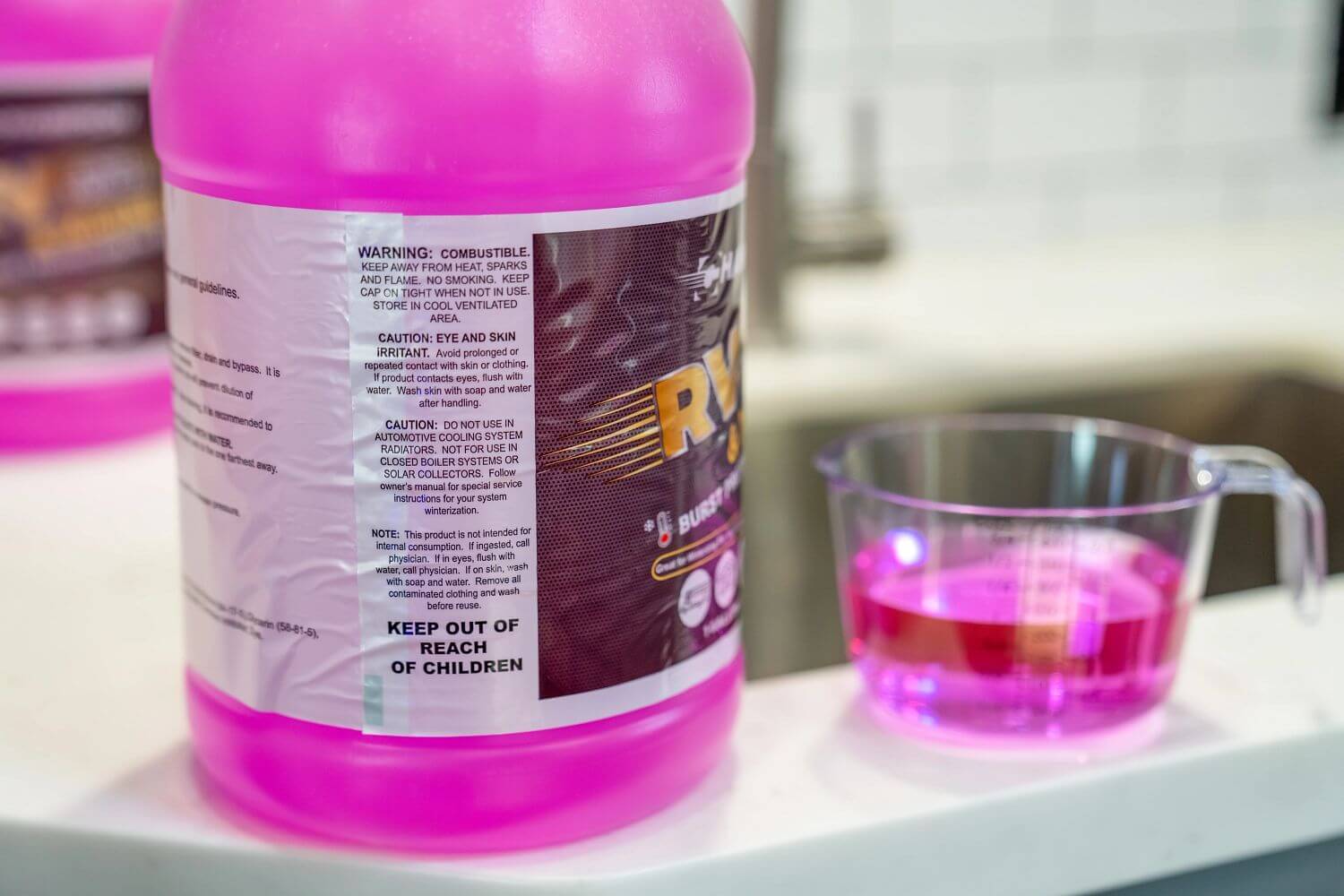
Yes, but RV antifreeze evaporates much more slowly than water. This is one reason antifreeze effectively protects your RV’s plumbing when you aren’t using it for an extended period.
Under the right conditions, however, the antifreeze will evaporate. The first condition is if the temperature of the antifreeze rises above 223℉ – not impossible, but highly unlikely during winter RV storage.
The second condition is if antifreeze is mixed with water to achieve a 50/50 ratio. This is not recommended for winterizing your RV, but the effect will be a diluted solution that evaporates slower than water but more quickly than an undiluted solution.
Does RV Antifreeze Go Bad?
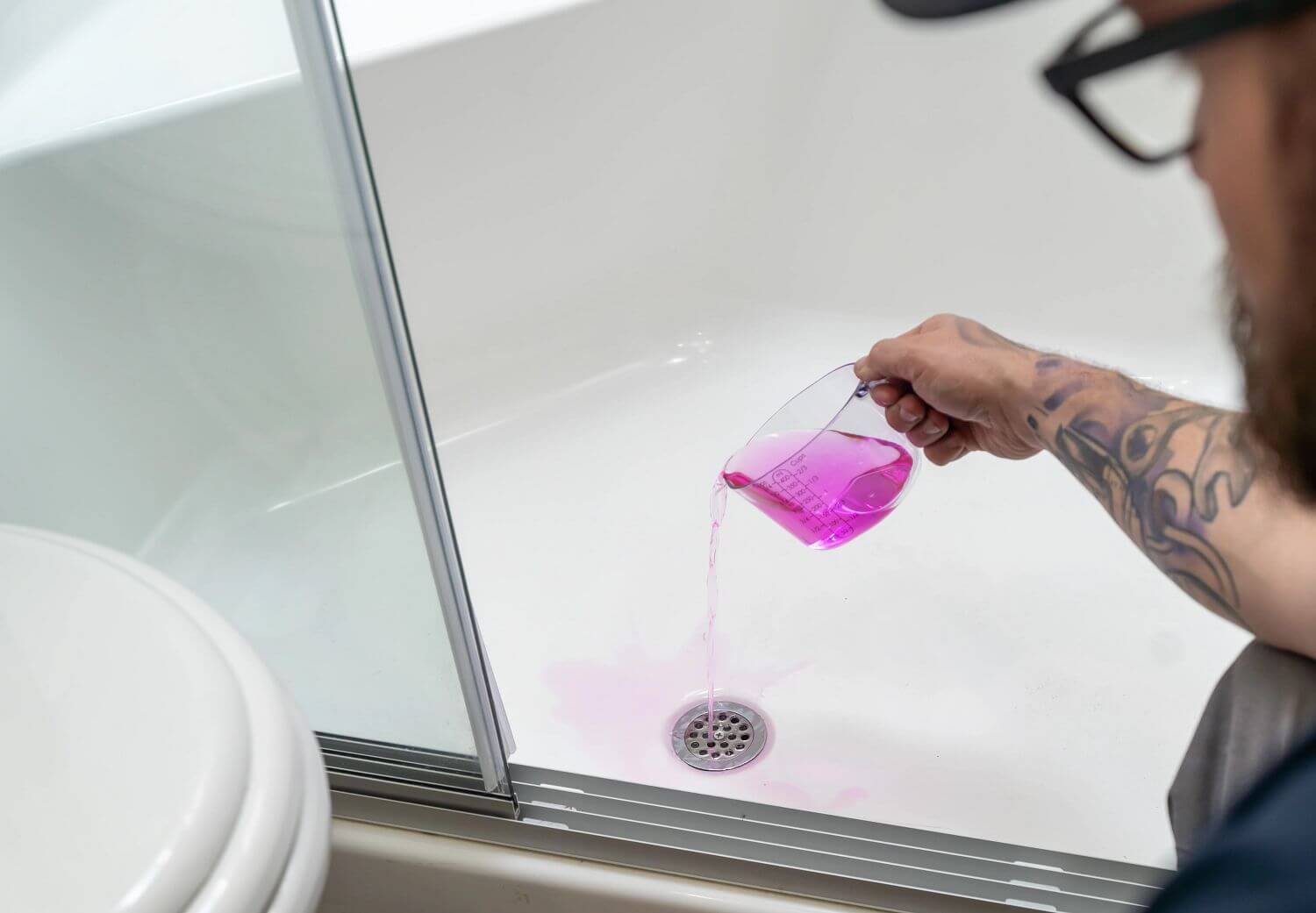
Most RV antifreeze lasts anywhere from 1 to 4 years once opened. Depending on your product choice, your bottle(s) may or may not be labeled with an expiration date. If yours aren’t, a simple test is to shake the bottle and observe the liquid inside. If bubbles appear, your antifreeze has expired.
Here are some tips to maximize your RV antifreeze’s shelf life:
- Only open bottles when you’re ready to use them for winterization.
- Store RV antifreeze in a cool, dry, shaded location.
- Avoid leaving it outside in direct sunlight, especially when temperatures exceed 50℉.
Can You Use RV Antifreeze in a Car or Truck?
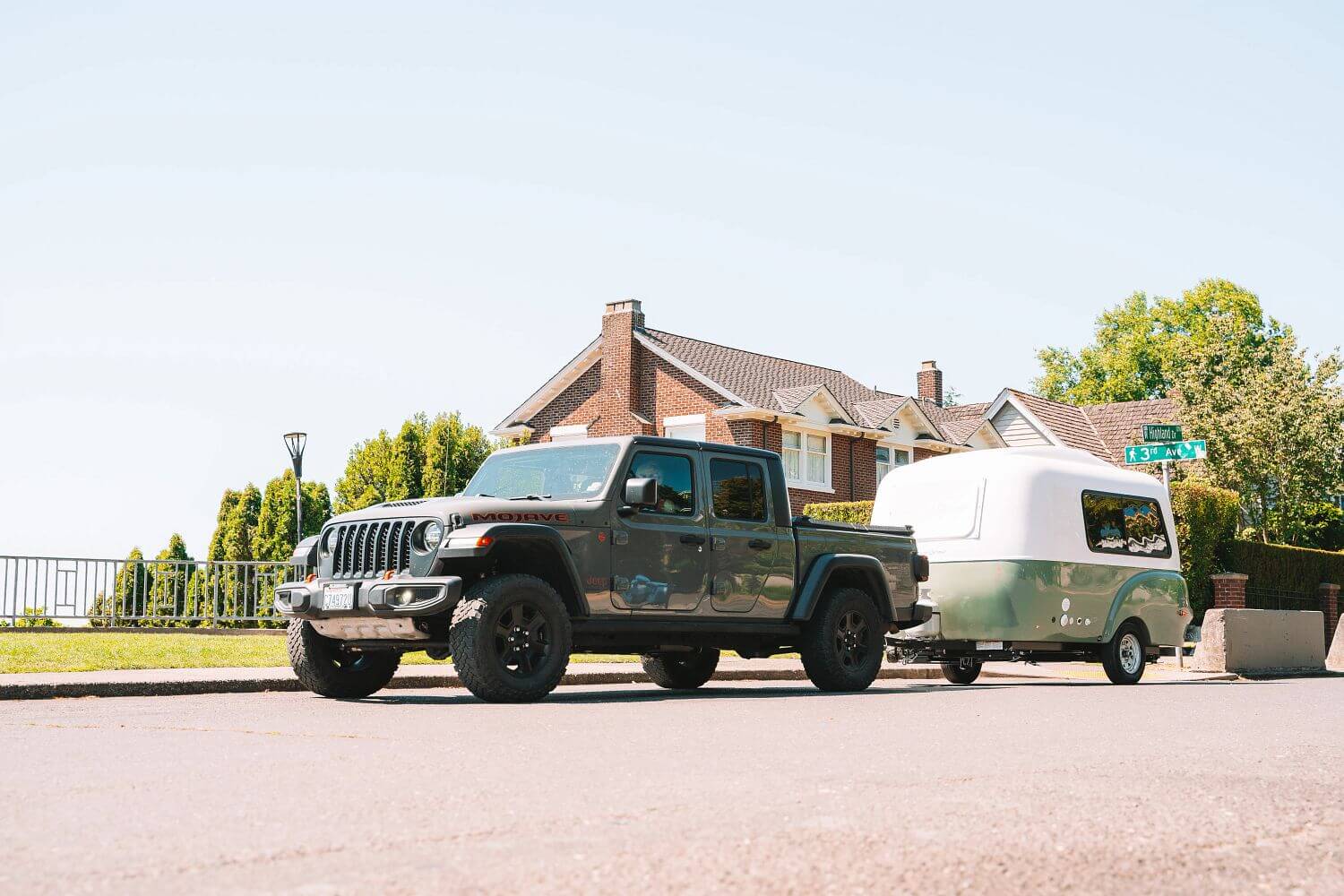
No, RV antifreeze and the recommended antifreeze for your automotive are not interchangeable. You shouldn’t use RV antifreeze in an automotive, and you can’t use the same antifreeze you use for your automotive to winterize your RV.
This is because RV antifreeze is designed for your plumbing, while automotive antifreeze is designed for the engine. Automotives usually require ethanol-based antifreeze (or an ethylene glycol base), which is toxic and should never be used in your RV’s freshwater system.
So if you have a motorhome, you’ll need separate antifreeze solutions for your engine and your RV’s plumbing. The bottom line – find an antifreeze recommended by your automotive manufacturer and use a less toxic propylene glycol antifreeze to keep your RV’s plumbing lines safe during the winter.
Where to Buy RV Antifreeze
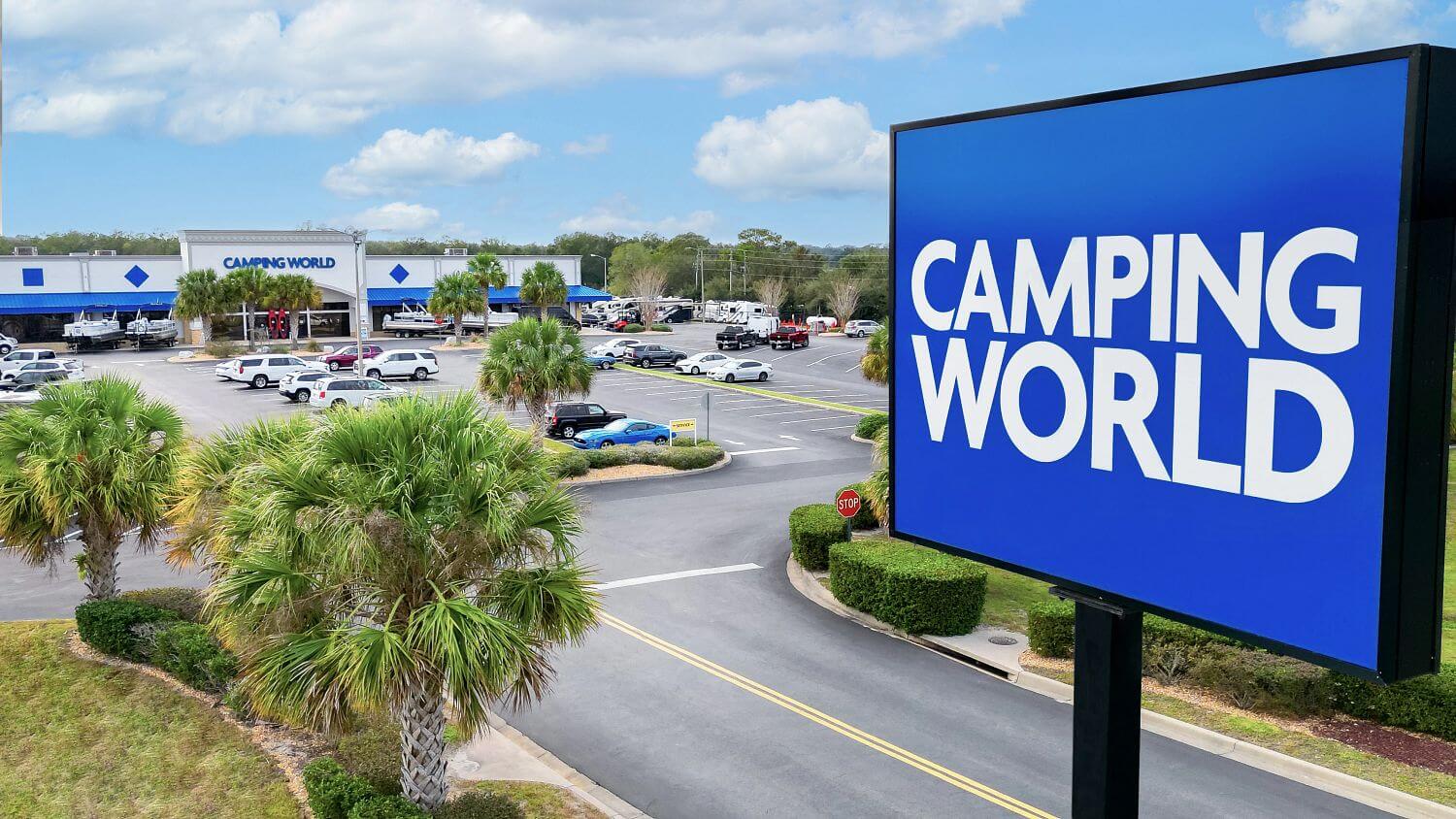
Find your nearest Camping World location to pick up RV antifreeze before it’s time to winterize again. Our recommended product is the Champion RV & Marine Antifreeze, but if you’ve never winterized your RV before, our RV winterization bundle gives you everything you need to get the job done.
Check out Camping World’s selection of RV antifreeze products.
Knowing where to find and how to use RV antifreeze is key to keeping your water lines healthy when temperatures dip below freezing. Hopefully, these answers will help with your future winterization efforts, but please don’t hesitate to reach out if you have others.
Do you have other questions about RV antifreeze or how to use it? Share them in the comments below!










Is Champion pool antifreeze fully dispersible, meaning will it mix fully with any water left in a line. I read that RV antifreeze is fully soluble but not sure if that is the same.
Also, I made the mistake of back filling the inlet side of the pool pump with Champion RV antifreeze but then drained it out and flushed it with water after realizing my mistake. It was left in 3 days. Will this cause damage to rubber seals and metal in the pump?
Thanks
Hi Steven,
I just want to understand your question a bit better.
When you say ‘pool pump’, are you referring to your RV’s water pump? Or a separate pump you’re using to pump antifreeze into your RV’s plumbing? And how did you go about back-filling it?
Looking forward to your reply!
Do I need to “blow out” the water lines before I use anti freeze? I have seen other recommendations to do that step first – thanks the video was helpful.
Hi Tom,
Yes, we do recommend that step…if you have access to compressed air and have the proper device need to regulate air pressure to avoid damaging your lines. If not, all of our service centers offer Basic and Upgraded Winterization packages to do this properly for you. Here’s a link to our tutorial on winterization: https://cwblog.cwmkt.app/learn-to-rv/how-to-winterize-your-rv/
And another link to help you find service centers near you: https://rv.campingworld.com/rv-service-maintenance#js-anchor-locations
Is antifreeze safe on acrylic shower floor
Hi Darcie,
Propylene Glycol, or RV Antifreeze, is non-toxic and will not destroy plastics, but it probably will result in permanent staining if not cleaned up quickly. Having antifreeze drip from faucets is normal as temperatures fluctuate or the RV is moved around, so it’s best to open the low point drains and faucets after winterizing to draw the antifreeze away from the outlet of the faucets. Shower wands should be disconnected, blown out, and reinstalled as well.
Informative article, however it does not address the issue of which type antifreeze to use.
Is Alcholol/propylene glycol better than straight propylene glycol products. Does alcholol blends degrade rubber seals in plumbing systems?
Hi Jan!
Propylene Glycol is alcohol. It is a non-toxic product that is safe for use in potable water systems. Ethylene Glycol is also an alcohol and is used to make automotive antifreeze. Unlike Propylene Glycol, Ethylene Glycol is extremely toxic if ingested and should never be used in potable water systems. Both types come in different brands, colors, and concentrations, but the customer need only determine if they require non-toxic and to what temperature it must protect to. In short, yes, alcohols can degrade rubber seals over time, but RV antifreezes are considered safe and stable within the plumbing pipes for 2 to 5 years.
Let us know if you have any follow up questions!
Tucker there are 3 types of antifreeze. The type used in an automobile engine, ethylene glycol which is poison and is never meant for winterization but then there are the 2 types that are suitable for potable water, ethanol based and propylene glycol based. Propylene glycol is not alcohol, it is suitable for winterizing potable water and marine raw water cooled engines. The Ethanol based is only suitable for potable water and is half the price of the propylene based. Jan is asking if the cheap stuff , alcohol based, will degrade rubber in fresh water systems like in the water pump or toilet seals. If so, then what is it suitable for?
Hi Tim,
This is the RV antifreeze I’ve utilized in my trailer, without any issue: https://www.campingworld.com/champion-rv-marine-antifreeze-gallon-132059.html. But I never leave it in my system for more than a few months at a time, although it’s rated to be safe and stable in RV plumbing for 2-5 years.
I’ll inquire further with our technical service team to see if I can get more information!
If I am using my travel trailer during the winter how do I protect the water system from freezing? If the interior is kept warm, will this keep water system from freezing? Will be camping in temperatures from 20 degrees farenheight and up.
Will not have access to water source other than holding tank and need water for interior use; sinks and shower
Hi William,
Winter RV camping is a challenge, but it’ll be much easier if your trailer is built for four-season use. What make and model do you have?
I once spent a winter in an older Fleetwood Bounder in my hometown of Truckee, CA. Here are a few things I did that helped:
1. Enclosed the underbelly. Many RVers use foam board insulation for this, and the thickness you’ll need depends on the average low temperatures in your area.
2. Add a holding tank heating pad. They’re the best way to keep your tank’s contents from freezing. Some RVs are built with these, but here’s a link to our selection if yours isn’t: https://www.campingworld.com/maintain-rv/sewer/black-water/tank-blankets
2. Utilize a heated drinking water hose. I purchased this Camco product, which requires 120VAC power and worked great for us: https://www.campingworld.com/camco-freeze-ban-heated-drinking-water-hose-630040.html
3. Supplement your RV’s furnace with a RV space heater. Here are a few articles on the considerations for choosing an RV space heater and managing the extra moisture/condensation they can create inside your RV:
https://cwblog.cwmkt.app/gear-and-accessories/different-types-of-space-heaters-for-rvs/
https://cwblog.cwmkt.app/learn-to-rv/keeping-moisture-out-of-your-camper-and-why-its-important/
4. Research local propane companies and consider connecting to an external tank. We had a 120-gallon tank delivered and hooked up to our motorhome’s onboard ASME propane tank. The service also offered an auto-refill, which we took advantage of to ensure we never ran out of propane for cooking and heating our RV. Of course, it’ll be easier for you with the removable propane containers on your travel trailer, but ensuring you always have a backup is a smart idea.
I hope these ideas help, but feel free to reach out if you have any follow up questions!
Can I leave last year’s anti freeze in my motor home for another year?
Hi Larry,
When sealed within the RVs pipes and faucets, RV antifreeze should be fine for 2-5 years depending on the ambient temperatures. If it is in the P-traps or toilet bowl, it will evaporate and become syrup like in less than a year.
Hope that helps!
We just bought a 2018 pioneer Rd210 from camping world in Albany ny.
Love it. But have not been able to use hot water yet since it smells like hairspray!
I am on oxygen.I read this article and it seems to say no antifreeze in fresh water, so what is this smell from my water heater? Not in Albany but Kingston ny. I am camping in Georgia.
Hi Camille,
Sorry for the delayed response, but I wanted to reach out to our technical service team to get their thoughts. Here’s their reply:
Water heaters should never have antifreeze in them, true, but that doesn’t mean it didn’t happen. Also, water heaters should be flushed once per season and failure to do so can result in foul odors in the water. RV water systems should be sanitized with a bleach solution before use, and if this was done to this unit the freshwater could still carry some bleach scent. With locations in Georgia, it would be prudent to visit a CW location for a courtesy inspection.
Here’s a link where you can find the nearest service center to you: https://rv.campingworld.com/rv-service-maintenance#js-anchor-locations
And one more link on the specifics of sanitizing your fresh water system: https://cwblog.cwmkt.app/learn-to-rv/sanitize-your-rvs-freshwater-system-in-5-simple-steps/
Hope that helps!
RV antifreeze and a regular antifreeze are different products with distinct roles for each vehicles, so don’t use an RV antifreeze for your car.
Is it ok to leave rv antifreeze in rv lines for over a year ?
Hey Jack,
Most RV antifreeze has a shelf life of 1-4 years, but that is when kept in its original sealed container. Still, RV antifreeze contained within the water lines of your RV is stable for very long periods of time. Any that is exposed to the air will gum up.
Hope that helps!
Great help but my question is why no one talks about seniors an handicap issues how to make things simply accessible for all us old poops that need this?
Seems we are not included in easy methods for us physically challenged seniors !
Hi Rox!
This is great feedback, and I look forward to incorporating it as we strive to better serve you! In the immediate future, is there anything specific to RV winterization or using antifreeze that you’d like to see more accessible solutions for?
Our service centers are also a great resource if you’re struggling with anything related to seasonal RV maintenance: https://rv.campingworld.com/service
I hope that helps and look forward to hearing back from you!